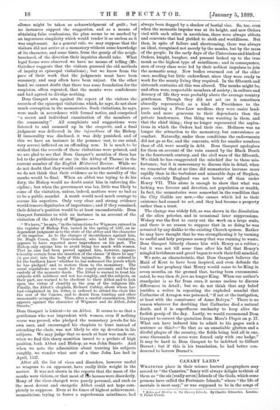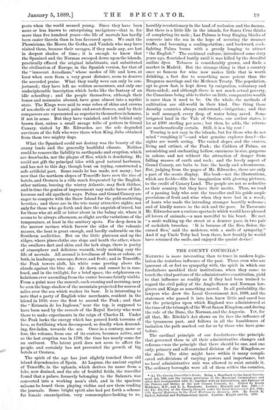CANARY LAND.* WHATEVER place in their science learned geographers may
accord to "the Canaries," fancy will always delight to think of them as "the six [really seven] Islands of the Gods, which some persons have called the Fortunate Islands," where "the life of mortals is most easy," or was supposed to be in the songs of
• Rides and Studies in the Canary Islands. By Charles Edwardes. London.: T. Fisher Unirin.
poets when the world seemed young. Since they have been more or less known to enterprising navigators—that is, for more than five hundred years—the life of mortals has hardly been easier therein than in less favoured spots. We omit the Phoenicians, the Moors, the Goths, and Vandals who may have visited them, because their ravages, if they made any, are lost in deepest shades of time ; it is enough to know that the Spaniard and the Norman swooped down upon the islands, practically effaced the original inhabitants, and substituted the civilisation of Europe, in the Spanish version, for that of the "innocent Arcadians," whose modes of life and laws, at least when seen from a very great distance, seem to deserve the accorded praise. What they really were can only be con- jectured; they have left no written mementoes, and only one undecipherable inscription which looks like the fantasy of an idle schoolboy ; and the people themselves, although their bones and mummies abound, have gone almost into a mythic state. The Kings were said to wear robes of skins and crowns of sea-shells or of laurel, palm and sweet-flowers, and by their conquerors are represented as superior to themselves in honour, if not in arms. But they have vanished, and left behind only brown dust, unless a small savage tribe of potters in Grand Canary, visited by Mr. Edwardes, are the sole degraded survivors of the folk who were there when King Juba obtained from them two mighty dogs.
What the Spaniard could not destroy was the beauty of the sunny lands and the generally healthful climate. Neither could he remove the liability to earthquake and eruption, which are drawbacks, nor the plague of flies, which is desolating. He could not gift the principal isles with good natural harbours, and has not to this day, though bent on trying, constructed a safe artificial port. Some roads he has made, not many ; but now that the northern slopes of Teneriffe have seen the rise of hotels, and Orotava is a villa much frequented by the English, other nations, braving the wintry Atlantic, may flock thither, and in time the genius of improvement may make havoc of list- lessness and old apathetic ways. Palma and Grand Canary are eager to compete with the Snow Island for the gold-scattering heretics ; and there are in the trio many attractive sights, not only for those who go forth and dare the anguish of travel, but for those who sit still or loiter about in the balmy air, where it seems to be always afternoon, so slight are the variations of the temperature, at least in the sanitary spots. For deep down in the narrow ravines which furrow the sides of the volcanic masses, the heat is great enough, and hardly endurable on the Southern acclivities. But on the little plateaux and up the ridges, where pines clothe one slope and heath the other, where the swallows dart and skim and the lark sings, there is purity of atmosphere and delicious warmth, truly making easy the life of mortals. All around is loveliness of form or colour, or both, in landscape, seascape, flower, and fruit; and in Teneriffe, the Peak towers aloft, his white cone peering above the clouds against the blue sky. At dawn and sunset he is rose- hued, and in the twilight, for a brief space, the sulphurous ex- halations ever ascending from the crater become faintly visible From a point near the summit, each evening and morning, may be seen the huge shadow of the mountain projected for scores of miles over the sea which washes its base. It is interesting to note that a party of English wine merchants, resident in the island in 1650, were the first to ascend the Peak ; and that the " Estancia de les Ingleses," near the top, is supposed to have been used by the savants of the Royal Society who went there to make experiments in the reign of Charles II. Under the Peak lurks the energy which has poured forth torrents of lava, so fertilising when decomposed, so deadly when descend- ing, fire-laden, towards the sea. Once in a century, more or less, the volcano, from one of its craters, becomes active, and as the last eruption was in 1798, the time has nearly come for an outburst. The latent peril does not seem to affect the people, and certainly has not prevented the growth of big hotels at Orotava.
The spirit of the age has just slightly touched these old island dependencies of Spain. At Laguna, the ancient capital of Teneriffe, in the uplands, which derives its name from a lake, now drained, and the site of fruitful fields, the traveller found that a palace, formerly belonging to the Salazars, was converted into a working men's club, and in the spacious saloons he heard them playing violins and saw them reading the journals. Some bright spirit also had put forth a scheme for female emancipation, very commonplace-looking to us, horribly revolutionary in the land of seclusion and the duenna. But there is a little life in the islands, for Santa Cruz thinks of completing its mole ; Las Palmas is busy flinging blocks of concrete into the sea in the hope of securing the steamer traffic, and becoming a coaling-station ; and backward, cock- fighting Palma burns with a greedy longing to attract "the English." The cochineal culture, introduced some sixty years ago, flourished lustily until it was killed by the dreadful aniline dyes. Tobacco is considerably grown, and finds a market in Madrid. But the strange thing is that a country once so famous for wine now makes little that is worth drinking, a fact due to something more potent than the Braganza marriage and the Methuen Treaty. The population, apt to grow fast, is kept down by emigration, voluntary and State-aided ; and although there is not much actual poverty, the Canarians being able to thrive on little, comparative wealth is rarer than it used to be. On the whole, the methods of cultivation are old-world in their kind. One thing these drouthy countries always understand,—irrigation; and that is well managed, every drop of water being saved. Some irrigated land in the Vale of Orotava, our author states, is let at £300 sterling per acre ; but then, he adds, the returns are mathematically certain. Still, it is a big rent !
Touring is not easy in the islands, but for those who do not mind "roughing it "—and what genuine explorer does ?—the sights are worth seeing. The varied slopes and the craters, living and extinct, of the Peak ; the Caldera of Palma, an astonishing and enchanting hollow, enormous in size, gorgeous in colour, and not without the attraction of danger from falling masses of earth and rock ; and the lovely aspect of Grand Canary, are baits to lure the hardy and adventurous. But, judging from the pages of Mr. Edwardes, these are only a part of the scenic display. His book—not the illustrations, which are feeble—fills the imagination with glowing pictures, to the credit of Canary Land. The people are not so seductive as their country, but they have their merits. Thus, we read of a passing lady who sent the traveller and his guide ample provisions of fruit and wine when they were lost in a wood ; of hosts who made the intruding stranger heartily welcome; and of kindly nurses to the sick and the poor. In Tacoronte Mr. Edwardes saw a curious spectacle which would have pleased all lovers of animals,—a man merciful to his beast. He met "a mule walking up the street at a demure pace, in two pair of sackcloth breeches. It is because of the flies, Seiior, the cursed flies,' said the muleteer, with a smile of sympathy." And if my Uncle Toby had been there, how frankly he would have returned the smile, and enjoyed the quaint device !















































 Previous page
Previous page